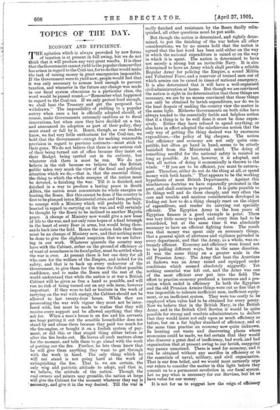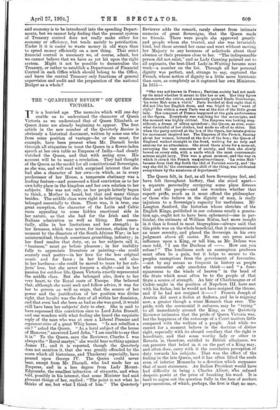TOPICS OF THE DAY.
ECONOMY AND EFFICIENCY.
T"agitation which is always provoked by new forms of taxation is at present in full swing, but we do not think that it will produce any very great results. It is clear that the Government cannot yield to the popular clamour that has arisen in regard to the Coal-tax, for to do that would make the task of raising money in great emergencies impossible. If the Government were to yield now, people would feel that it was only necessary to scream loud enough to prevent taxation, and whenever in the future any change was made in our fiscal system obnoxious to a particular class, the word would be passed round,—" Remember what happened in regard to the Coal-tax. If we only protest loud enough, we shall beat the Treasury and get the proposed tax withdrawn." The impossibility of yielding to a popular outcry when once a tax is officially adopted should, of 'course, make Governments extremely cautious as to fiscal innovations, but when once they have decided on a tax, and announced its adoption as part of their policy, they must stand or fall by it. Hence, though, as our readers know, we feel very little enthusiasm for the Coal-tax, we. hold that the Government—except for making reasonable provision in regard to previous contracts—must stick to their guns. We do not believe that there is any serious risk of their being turned out of office because they insist on their Budget being carried out in its entirety, but whatever risk there is must be run. We do not believe in the risk because we believe that the British public takes very much the view of the fiscal and political situation which we do,—that is, that the essential thing, • the thing to which the whole energies of the nation must be devoted, is finishing the tvar. Till it is finished, and finished in -a way to produce a lasting peace in South Africa, the nation must concentrate its whole energies on beating the Boers. But this cannot be done if the country is first to he plunged into a Ministerial crisis, and then, perhaps, to emerge with a Ministry which will probably be half- hearted in regard to carrying on the war, and will certainly be thought by the Boers to be inclined to another Majuba peace. A change of Ministry now would give a new lease of life to the war, and not only raise hopes of a final triumph in the heart of every Boer in arms, but would bring thou- sands back into the field. Hence the nation feels that there must be no change of Ministry now, and that nothing must be done to give the slightest suspicion that we are falter- ing in our work. Whatever quarrels the country may have with the Cabinet, either on the ground of efficiency or of want of soundness in its fiscal policy, must be settled when the war is over. At present there, is but one duty for all who care for the welfare of the Empire, and indeed for its safety, and that is to back up every endeavour of the Government, to give them for the time the fullest possible confidence, and to make the Boers and the rest of the world understand that while the nation is at war a British Cabinet will be given as free a hand as possible, and will run no risk of being turned out on any side issue, however important. If they were to fail or hesitate in the work of carrying on the war with energy, the Cabinet should not be allowed to last twenty-four • hours. While they are prosecuting the war with vigour they must not be inter- fered with, but must be made to realise that they will receive every support and be allowed anything that they ask for. When a man's house is on fire and his servants are busy putting it out the sensible householder does not stand by and abuse them because they paid too much for the fire-engine, or bought it on a foolish system of pay- ment, or did this or that stupid thing either before or after the fire broke out. He leaves all such matters alone for the moment, and tells them to go ahead with the work of putting. out the fire. Further, he lets them blow that he will give them anything they want to get through with the work in hand. The only thi g which he will not stand is not going hard at the work of extinguishing the fire. That is, we are certain, the only wisp and patriotic attitude to adopt, and that is, we believe, the attitude of the nation. Though the coal owners and miners may grumble, the nation at large will give the Cabinet for the moment whatever they say is necessary, and give it in the way desired. Till the war is really finished and resistance by the Boers finally relin- quished, all other questions must be put aside.
But though the nation is determined, and rightly deter- mined, to put the finishing of the war before all other considerations, we by no means hold that the nation is agreed that the last word has been said either on the way in which the national expenditure is raised or on the way in which it is spent. The nation is determined to have not merely a strong but an invincible Navy. It is also determined to have an Army which shall provide a reliable Regular Army for policing the Empire, a sound Militia and Volunteer Force, and a reservoir of trained men out of which armies can be raised in times of national emergency. It is also determined that it will have a well-organised civil administration at home. But though we are convinced the nation is right in its determination that these things are necessary, we are by no means convinced that these things can only be obtained by lavish expenditure, nor do we in the least despair of making the country view the matter in the same light. Hitherto Governments on both sides have always tended to the essentially feeble and helpless notion that if a thing is to be well done it must be done expen- sively. Either they have refused to spend anything, or else have in effect adopted the mischievous notion that the only way of getting the thing desired was by enormous expenditure,—the policy of big cheques. The notion that efficiency and economy are not only quite com- patible, but often go hand in hand, seems to be utterly banished from the Ministerial mind. The doing of something needful for the national safety is resisted as long as possible. At last, however, it is adopted, and then all notion of doing it economically is thrown to the winds. "If you are to be efficient, you must be extrava- gant. Therefore, either do not do the thing at all, or spend money with both hands." That appears to be the working hypothesis of most British Departments. Against this mischievous doctrine we have repeatedly protested in the past, and shall continue to protest. It is quite possible to do things well and do them cheaply, and very often the care and trouble and anxious consideration developed in finding out how to do a thing cheaply react on the object of expenditure, and render its carrying out specially efficient. The Egyptian Army in the lean years of Egyptian finance is a good example in point. There was very little money to spend, and every item had to be considered, but at the same time, it was absolutely necessary to have an efficient fighting force. The result was that money was spent only on necessary things, that a general spirit of alertness and vigilance pervaded in every department, and that the Army, as a whole, was ex- tremely efficient. Economy and efficiency were found not to be pulling different ways, but in the same direction.
It was the same thing on a greater scale in the old Prussian Army. The Army that beat the Austrians at Sadowa was an Army raised and equipped under conditions which seemed absolutely niggardly. Yet nothing essential was left out, and the Army was one of the most efficient ever put into the field. The effort to practise economy produced a keenness and a pre- cision which ended in efficiency In both the Egyptian and the old Prussian Armies things were cut so fine that it was impossible to tolerate inefficient men, inefficient equip- ment, or an inefficient system. They were too costly to be employed when value had to be obtained for every penny. Now we believe that in the British Navy, in the British Army, and in the British Civil Service it would be quite possible for strong and resolute administrators to declare that they would insist not only upon as much efficiency as before, but on a far higher standard of efficiency, and at the same time practise an economy now quite unknown. In hunting out waste and discovering places where economies could be made, we feel certain that they would also discover a great deal of inefficiency, bad work, and bad organisation that at present owing to our lavish, easygoing way passes -unnoticed. There is need for economy, and it can be obtained without any sacrifice in efficiency or in the essentials of naval, military, and civil organisation. That is our firm belief, and we would most earnestly urge our rulers to consider the matter in this light before they commit us to a permanent revolution in our &seal system. Let us pay what is necessary for our Services, but let us have value for our money. , It is not for us to suggest how the reign of efficiency and economy is to be introduced into the spending Depart- ments, but we cannot help feeling that the present system of Treasury control does not really make either for economy or efficiency, but tends merely to petrifaction. Under it it is easier to waste money in old ways than to spend money efficiently on a new thing. That 'strict financial control is necessary we, of course, admit, but we cannot believe that we have as yet hit upon the right system. Might it not be possible to decentralise the Treasury, or rather to establish a Department of Financial Control in each Office which should belong to the Office, and leave the central Treasury only functions of general supervision and audit and the preparation of the national Budget as a whole ?























































 Previous page
Previous page